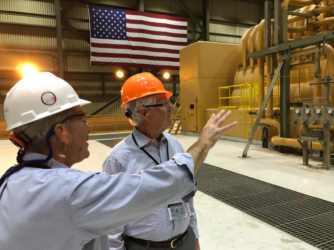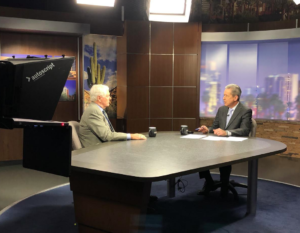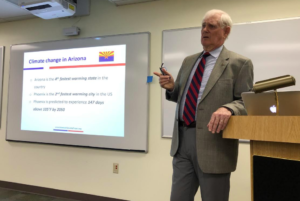
ASP in Arizona: National Security Implications of Climate Change
On November 6 and 7, 2019, Lt Gen. Dirk Jameson, USAF (Ret.), American Security Project (ASP) Consensus Board Member, visited Phoenix, Arizona for a series of public events on the national security implications of climate change.
 Arizona knows the effects of climate change. The state has warmed about 2 degrees in the last century. The number and intensity of heat waves are increasing. Arizona is the 4th fastest warming state in the country. Phoenix is the 2nd fastest warming city in the US, and Phoenix is predicted to experience 147 days above 105°F by 2050. It currently experiences 121 days above 105°F. By some estimates, summers in Phoenix will be like summers in Kuwait, in 2100.
Arizona knows the effects of climate change. The state has warmed about 2 degrees in the last century. The number and intensity of heat waves are increasing. Arizona is the 4th fastest warming state in the country. Phoenix is the 2nd fastest warming city in the US, and Phoenix is predicted to experience 147 days above 105°F by 2050. It currently experiences 121 days above 105°F. By some estimates, summers in Phoenix will be like summers in Kuwait, in 2100.
As temperatures increase, precipitation is decreasing. By 2050, the severity of widespread summer drought is projected to more than triple in Arizona, the second largest increase behind Washington. In 2019, Arizona experienced one of its driest monsoon seasons on record. Snowpack has also decreased significantly since 1950s leading to decreases in water flow in the Colorado River. Snow is melting earlier, impacting agriculture and livestock.
Lt. Gen. Jameson kicked off his time in Arizona with a radio interview with Steve Goldstein from KJZZ, an NPR affiliate in Phoenix. During the interview, Lt. Gen. Jameson said the awareness surrounding climate security is growing and that it is affecting every corner of the globe. For instance, in Bangladesh, the sea level need only rise a little more than a foot to displace millions of people creating instability in the region. Listen to the full interview here.
 Later on Wednesday, Lt. Gen. Jameson appeared on Arizona Horizon, a PBS affiliate in Phoenix, to discuss the connection between national security and climate change. Lt. Gen. Jameson explained that as the climate continues to change, infrastructure will be threatened by rising sea levels and worsening storms. Rising temperatures will threaten the training of soldiers, airmen, and marines, potentially effecting military readiness. ASP’s new website examines the climate threat to military bases and makes recommendations for mitigation and adaptation. Watch the full segment here.
Later on Wednesday, Lt. Gen. Jameson appeared on Arizona Horizon, a PBS affiliate in Phoenix, to discuss the connection between national security and climate change. Lt. Gen. Jameson explained that as the climate continues to change, infrastructure will be threatened by rising sea levels and worsening storms. Rising temperatures will threaten the training of soldiers, airmen, and marines, potentially effecting military readiness. ASP’s new website examines the climate threat to military bases and makes recommendations for mitigation and adaptation. Watch the full segment here.
The following day, Lt. Gen. Jameson presented at Arizona State University’s (ASU) Global Institute of Sustainability. The event drew over roughly 50 student, faculty, and community members to the discussion. After the presentation, the audience discussion focused on ways the public sector and universities, like ASU, can partner with the Defense Department to tackle climate change.
 The final stop in Arizona was a presentation and tour of Palo Verde Nuclear Generating Station in Tonopah, Arizona. In 1988, Palo Verde became fully operational, and each reactor produces roughly 1.4 GW of power. It is the nation’s largest power producer and has been for 27 consecutive years. The power generated at the plant supplies roughly 4 million customers in southern Arizona and southern California.
The final stop in Arizona was a presentation and tour of Palo Verde Nuclear Generating Station in Tonopah, Arizona. In 1988, Palo Verde became fully operational, and each reactor produces roughly 1.4 GW of power. It is the nation’s largest power producer and has been for 27 consecutive years. The power generated at the plant supplies roughly 4 million customers in southern Arizona and southern California.
Throughout his events in AZ, Lt. Gen. Jameson clearly outlined how climate change effects national security. More days of extreme heat means US troops are able to train outside fewer days each year, threatening military readiness. Higher temperatures and drier conditions can lead to increased threat of wildfire, constraining live fire drills. Further, intensifying drought can impact the water supply of installations, forcing the base to import water from elsewhere.
The US must prepare for such a future and address how it is contributing to climate change. As a nation, the US must transition from fossil fuels to cleaner and more sustainable energy sources, such as hyrdo, nuclear, solar, and wind. If the US does not lower its carbon emissions, Arizona is only going to get warmer, droughts are only going to get worse, water resources are only going to get smaller, and the threat to national security is only going to get larger.





